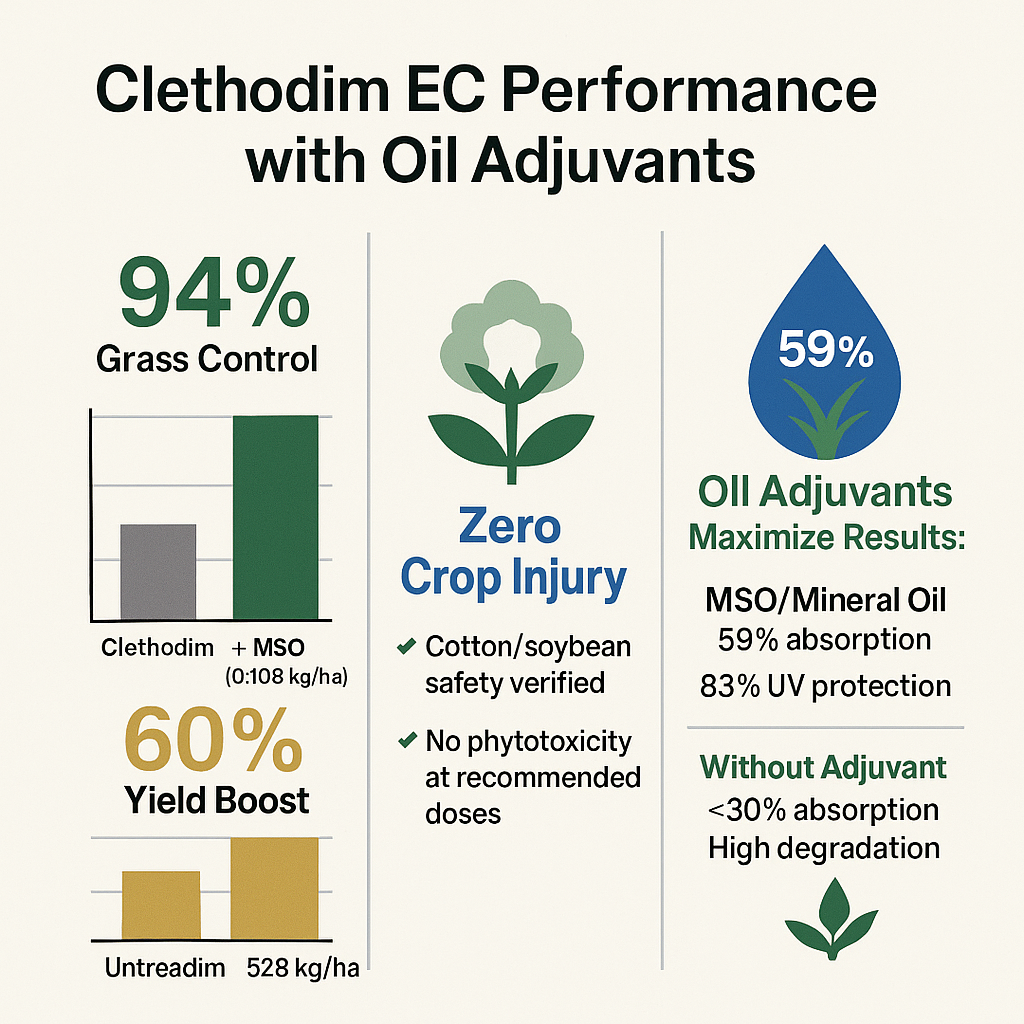- info@supremespl.com
- +91 11 47023023, +91 11 47023024
SUPROL V101: Enhancing Post-Emergent Grass Weed Control with Advanced Clethodim Adjuvant Systems
Clethodim, a cyclohexanedione (CHD) herbicide, is a post-emergence graminicide widely used in cotton, soybean, and groundnut crops to control annual and perennial grass weeds. However, its field efficacy is highly dependent on adjuvant selection, which influences absorption, translocation, and photostability. In this technical deep dive, we explore how adjuvants enhance Clethodim EC performance, drawing from peer-reviewed research and field trials. We also highlight SUPROL V101, our high-performance adjuvant for Clethodim EC formulations, optimized with oil-based adjuvant technology for superior weed control.
Why Adjuvants Matter in Clethodim Applications
Clethodim’s mode of action involves ACCase inhibition, disrupting fatty acid synthesis in grasses. However, its efficacy is limited by:
o Poor cuticular penetration (due to waxy weed surfaces)
o Photodegradation (rapid breakdown under UV exposure)
o Antagonism (when mixed with certain herbicides like bromoxynil)
Adjuvants play a critical role in overcoming these challenges by:
o Enhancing droplet retention
o Improving cuticle penetration
o Protecting against UV degradation
Scientific Insights: Adjuvant Efficacy in Clethodim Applications
Data-Driven Analysis from Peer-Reviewed Research, (Culpepper et al. 1999)
| Adjuvant System | Absorption Rate | Photoprotection | Performance Tier | Key Mechanism |
|---|---|---|---|---|
| Methylated Seed Oil (MSO) | 59% | 83% | ★★★★★ Optimal | Lipid-mediated cuticle diffusion |
| MSO + OSL Blend | 55% | 79% | ★★★★☆ Enhanced | Dual-action: Penetration + spread |
| Crop Oil Concentrate (COC) | 48% | 66% | ★★★☆☆ Viable | Moderate lipid enhancement |
| Organosilicone (OSL) | 34% | 39% | ★★☆☆☆ Limited | Super-spreading only |
| Nonionic Surfactant (NIS) | 21% | 36% | ★☆☆☆☆ Ineffective | Surface wetting only |
1. Methylated Seed Oil (MSO): The Performance Benchmark
Why it dominates:
o Achieves 59% herbicide absorption - nearly 3× higher than NIS
o Provides 83% UV shielding by accelerating cuticular penetration (40 min)
o Lipophilic properties dissolve epicuticular waxes, enabling rapid diffusion into vascular tissues
o Field correlation: Brazilian cotton trials show 94% grass control with oil-adjuvanted clethodim
2. Crop Oil Concentrate (COC): Cost-Effective Alternative
Operational advantages:
o 48% absorption rate balances performance and economics
o 83% UV shielding provide moderate cuticle disruption
o Preferred for large-scale applications where MSO cost is prohibitive
3. Organosilicone (OSL): Handle With Caution
Critical limitations:
o Ultra-low surface tension (25 mN/m) improves coverage but not absorption
o 34% absorption fails to protect clethodim from photodegradation
o Only recommended in blends with MSO (e.g., MSO+OSL maintains 55% absorption)
4. Nonionic Surfactant (NIS): Scientifically Unsuitable
Why avoid:
o Minimal absorption (21%) - herbicide remains vulnerable on leaf surfaces
o No lipid solubility - no cuticle penetration enhancement
o 36% photoprotection leads to >60% efficacy loss in high-UV conditions
Key Agronomic Implications
o Oil adjuvants are non-negotiable - MSO delivers 2.8× greater absorption than NIS
o Photoprotection = Performance - Every 10% UV shielding increase ≈ 15% efficacy gain
o Avoid standalone surfactants - OSL/NIS increase runoff risk without penetration benefits
"Clethodim without oil adjuvants is scientifically incomplete. MSO isn't an additive – it's a force multiplier." Based on Culpepper et al. 1999 Weed Technology findings
Field Validation: Brazilian Cotton Trial (Laca-Buendia & Pires, 1992)
A field study in Minas Gerais, Brazil, tested Clethodim + 0.5% mineral oil in cotton:
o 94% grass weed control at 0.108 kg/ha
o Zero crop injury (excellent selectivity)
o 60% higher yield vs. untreated plots
Key takeaway: Oil-based adjuvants (MSO or mineral oil) maximize Clethodim’s field performance.


SUPROL V101: Advanced Clethodim 24% EC with Optimized Adjuvant System
SUPROL V101 is a high efficacy Ajuvant system for Clethodim EC formulations, pre- optimised with MSO + COC for:
o Faster absorption (reducing UV degradation)
o Superior grass weed control (including resistant species)
o Enhanced rainfastness (stable within 2 hours)
Best Practices for Maximizing Clethodim EC Performance
o Use MSO or COC adjuvants – Avoid NIS for Clethodim.
o Apply in optimal conditions – Morning/evening to minimize UV exposure.
o Ensure proper spray coverage – Medium droplets for better retention.
Conclusion: The Right Adjuvant Makes the Difference
Clethodim is a powerful grass herbicide, but its performance hinges on adjuvant selection. Oil-based adjuvants (MSO, COC) significantly enhance absorption, translocation, and photostability, leading to higher weed control and crop yields. SUPROL V101, with its built-in adjuvant technology, ensures reliable, high-performance grass control in cotton, soybean, and groundnut crops.
References
o Culpepper, A. S., et al. (1999). Weed Technology, 13(3), 536–541.
o Laca-Buendia, J. P., & Pires, N. M. (1992). *Planta Daninha, 10(1-2), 21–30
Ready to Get Started?
Contact us today to discuss your surfactant requirements and discover how our
innovative solutions can enhance your agrochemical formulations.


